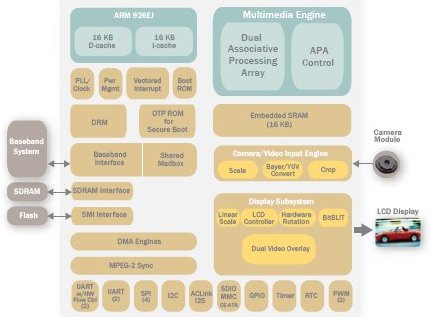POS systems run uClinux
May 19, 2008 — by Eric Brown — from the LinuxDevices Archive — 11 views ExaDigm announced that it is ramping up production on a new line of Linux-based point-of-sale (POS) terminals. The modular, PC-based terminals are based on the NeoMagic MiMagic applications processor, and ship with a Linux software development kit (SDK) says ExaDigm.
ExaDigm announced that it is ramping up production on a new line of Linux-based point-of-sale (POS) terminals. The modular, PC-based terminals are based on the NeoMagic MiMagic applications processor, and ship with a Linux software development kit (SDK) says ExaDigm.
(Click for larger view of the XD2100SP)
The line includes one countertop and two mobile models:
- Countertop XD1000 payment terminal
- XD2000 — has two RS-232 ports
- XD2100SP — one RS-232 port, but adds Ethernet and an internal PCI-PED (payment card industry PIN-entry device) reader



XD1000, XD2000, and XD2100SP (left to right)
(Click any to enlarge)
ExaDigm says it started ramping up production after recently receiving Class A certifications from Chase Paymentech Solutions, LLC and Heartland Payment Systems. Class A signifies “the highest level of technical support,” says ExaDigm.
The ExaDigm devices are based on NeoMagic's MiMagic 8, a highly integrated ARM-based system-on-chip (SoC) processor said to consume very little power. It supports up to 128MB of SDRAM, and offers a 16-bit host bus interface and on-chip memory for high-speed data transfer, says NeoMagic. On-chip peripheral interfaces support Smart Cards, as well as mobile TV, audio, video, still camera, VoIP, and GPS.

NeoMagic MiMagic 8 architecture
ExaDigm touts the modular nature of the terminals, which support interchangeable communication modules for Ethernet, WiFi, Bluetooth, dial-up, CDMA/1XRTT, and GSM/GPRS cellular communications. Each of the terminals offer 16MB SDRAM, expandable to 64MB, and 8MB of flash, expandable to 32MB. Each terminal is equipped with 128 x 64 pixel displays, keypads, magnetic cards readers, and printers.
All models offer 128 or 256-bit SSL encryption with VISA Cardholder Information Security Program (CISP) validation. The PCI/PED-equipped XD2100SP also offers 3DES encryption, Master/Session, and DUKPT key management. General options include a Smart Card reader, holster, battery charger, and car adapter. The XD1000 also offers a Contactless Payment Module (CPM) option with a “fully certified” RFID reader, and its own built-in WiFi port and host-based USB port.
The specifications listed for ExaDigm's three XD POS terminals are very similar. The following lists the specs for the XD2100SP, noting any differences with the other two models:
- Processor — 100MHz 32 bit ARM7 RISC-based MiMagic 8
- Memory — 16MB SDRAM, expandable to 64MB
- Flash storage — 8MB flash ROM, expandable to 32MB
- Display — 128 x 64 pixel (8 lines by 21 characters) LCD with back lighting (132 x 64 for XD1000)
- Keypad — 3 x 4 back-lit numeric keypad with 4 soft function keys; 3DES and DUKPT, PCI-approved (XD2100SP only)
- Optional peripherals: magnetic card reader, printer, smart card reader, etc.
- Battery — Lithium-ion 7.2V DC removable (except for XD1000)
- Other options — holster, battery charger, car adapter; RFID-based CPM module (XD1000 only)
- Dimensions — XD2000 and XD2100SP: 10.38 x 3.75 x 3.75 inches (26.4 x 9.5 x 9.5 cm); XD1000: 3.6 x 8.2 x 4.5 inches (11.3 x 9.3 x 20.4 cm)
- Weight — XD2000 and XD2100SP: 1.6 lbs (0.71 kg); XD1000: 1.35 lbs (0.61 kg)
- Operating temperature — 32 to 104 deg. F (0 to 40 deg. C)
- Operating system — Linux
ExaDigm's Linux-based Software Development Kit (SDK) supports development hosts running Fedora Core 8, Red Hat Enterprise Linux 5, or OpenSUSE 10.3. It includes an Eclipse integrated development environment (IDE), along with a simulator, toolchain, TMS, sample code, and documentation. In addition, says the company, “The Linux operating system makes the terminal a cost effective and flexible solution. Linux makes changing technologies fast and easy, ensuring that obsolescence and subsequent swap-out programs are a thing of the past.”
Availability
More on ExaDigm's payment terminals, which are now entering production, may be found here. More on the MiMagic line of application processors may be found here.
This article was originally published on LinuxDevices.com and has been donated to the open source community by QuinStreet Inc. Please visit LinuxToday.com for up-to-date news and articles about Linux and open source.